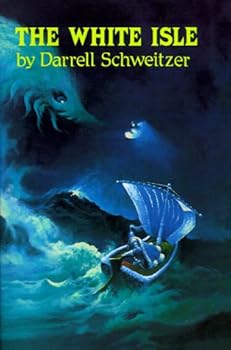
![]() The White Isle by Darrell Schweitzer
The White Isle by Darrell Schweitzer
Readers familiar with Darrell Schweitzer probably think of him mostly as someone who writes short stories, edits magazines and anthologies, and writes books and essays about speculative fiction. But he’s written a few novels, too. The White Isle, published in 1989, is one of these, though it was originally serialized in the magazine Fantastic in 1980. It tells the story of Prince Evnos of Iankoros who we meet as a boy and follow into madness.
The story is divided into two parts. In the first section, Prince Evnos is born, raised, educated, married, and sent off to war. When his wife dies in childbirth, he is enraged, so he learns to be a wizard and descends into the underworld to get her back. In the second part, he lives a miserable life on a rocky island with his unhappy daughter.
As Darrel Schweitzer reports in a 2003 interview with G.W. Thomas, The White Isle was his “attempt to write tragedy” when he was in his early twenties. The story was inspired by the Orpheus myth, Clark Ashton Smith’s “The Isle of the Torturers” and Shakespeare’s The Tempest (he says “it is the story of Prospero gone bad”). The premise is that “Life’s a bitch and then you die. The afterlife is worse…. everyone goes to Hell.” Not surprisingly, then, The White Isle, which is written in an archaic sounding style, is bleak and depressing.
The misery is somewhat alleviated by some wonderful imagery, especially when Prince Evnos is in the underworld. The story reminded me of Tanith Lee’s FLAT EARTH books with its dark underworld mythology, decadent visions, and lack of a hero, but while Lee writes gorgeous prose which elicits powerful emotions, Schweitzer’s prose is dull and detached. That, unfortunately, was its downfall. With misery heaped upon misery, it needed something more to lift it up.
I listened to the audiobook version produced by Wildside Press. It was narrated by Martin Gollery who has a pleasant voice, but whose interpretation, inflection, and tempo was not of professional quality.
As I learned in the interview with G.W. Thomas, Schweitzer considers The Mask of the Sorcerer to be his best novel-length work. I look forward to trying it, but I can’t heartily recommend The White Isle.



Hi Kat, I’m happy to say that The Mask of the Sorcerer is indeed *much* better than this book. I’ve read both… sort of. I gave up on the White Isle after getting about half way through it. The Mask of the Sorcerer is in my opinion, more of a four out of five star book.
That’s good to know. I’ll try The Mask of the Sorcerer. Thanks, Tristan!